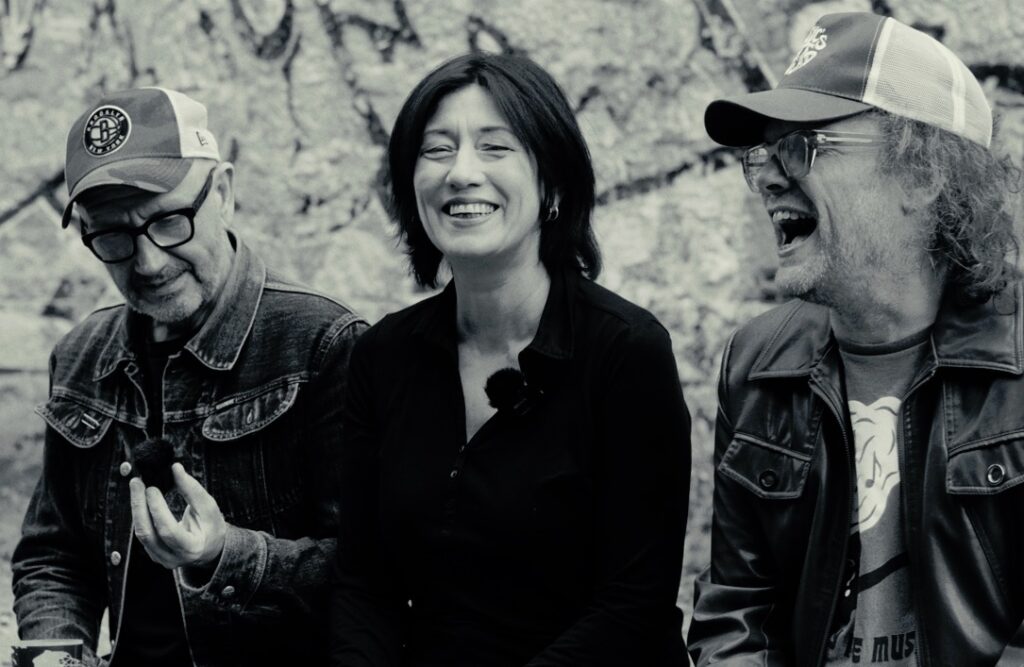
“There’s a bit in “Light From a Dead Star” and there’s one line in “Kiss Chase” where every now and again I get a bit choked up singing it. I think there’s a lot in therapy about looking after your inner child and that sort of stuff. I kind of get it, because reading those diaries [from which the lyrics stemmed] I just think, oh, poor Miki, she needs a hug.”
Miki Berenyi explains that even now, after having been years removed from the writing of these songs, as well as having just dived deep into her past while writing her recently published memoir, Fingers Crossed: How Music Saved Me From Success, she still might get a bit wistful from some of her old journal entries.
Berenyi was vocalist and songwriter for the 90’s British band Lush, a band that pushed forth musically under the then-novel labels of Britpop or alt rock, and often lumped in with shoegaze for the lack of an easy description of the group. Those in the United States might be most familiar with their song, “Ladykillers” which received buzzworthy amounts of radio play. Berenyi’s easily identifiable voice along with a hyperliterate lyrical sense carry the song. Lush would notably tour the US on Lollapalooza back in the days when it was a traveling festival in 1992.
At the time, alternative rock still had an underground air to it, and the Lush was amongst a lineup of bands whose followings still leaned more on the cultish than the mass mainstream audiences that would soon catch on a few years later.
Lush was releasing music on the semiunderground record label, 4AD. Fronted by Berenyi and childhood friend, Emma Anderson, Lush’s story progresses like a coming of age of project of friends who loved music and wanted to participate in the scene going on near Berenyi’s art school. However the tumultuousness of youth and the music industry created a storm, and not everyone would make it out unscathed.
That story is spelled out now, in Berenyi’s memoir, Fingers Crossed: How Music Saved Me From Success.
Berenyi is thoughtful, cheekily cantankerous and contemplative. It’s a combination of traits that guides the voice of her book, as well as our conversation.
“It was hard enough to convince me to write a memoir in the first place. I said no because I thought it was a stupid idea,” Berenyi describes of approaching the book. “I’ve said it many times, I don’t really read a lot of rock bios. They don’t really interest me, partly because I worked in that industry, I can smell the bullshit.”
Those familiar with Berenyi’s lyrics, either with Lush or with her later band Piroshka, can quickly parse out the complexity and depth of the language she writes in. It’s something that set Lush apart from simpler party bands of the 90’s alt rock scene. She laughs about it now.
“Part of what makes a catchy song is you can write in quite a simple way, which I’ve never been able to do. I can’t write a happy song not for love nor money.” She talks about having a bit of envy when it comes to creating more simple lyrics.
“I don’t know if you’ve seen that film 24 Hour Party People about Factory Records and Tony Wilson, but there’s a scene where they’re talking about the Happy Mondays, and he’s like, ‘He’s like W.H. Auden, his lyrics are amazing!’ and I get it. There’s a sort of street sensibility to it buy they still have depth. And I just think there’s absolutely no way I can achieve that! So I’m filled with admiration for people who can come across sounding a bit simplistic but actually have a sort of resonance and complexity to it.”
When it came to writing Fingers Crossed, Berenyi quickly decided against using a ghostwriter, opting to write her book on her own.
“The reason for me writing the book wasn’t like, ‘let’s have Miki Berenyi’s life story out there.’ It was about writing it. That’s the bit that was most interesting to me – the process of writing it.”
She confesses to not having much interest in reading about the celebrity lives of others, even contemporaries.
“Once people are famous and just listing all of their achievements, I find it quite boring. I get it, the fans want to read about what it’s like to meet David Bowie or whoever, but this just doesn’t interest me, so I just excised a lot of that. The first draft [of Fingers Crossed] was way longer, but you need to keep the plot flowing. As much as I love bits of [Charles] Dickens, it’s like fuck me, it does go on a bit, doesn’t it? There were bits I thought were interesting or funny but that disrupted the pace, so I cut it out. I just wanted the reader to be a part of it rather than looking from an admiring distance.”
Berenyi’s book received glowing reviews, topping lists for musician biographies. For Berenyi, it was also a chance to be candid and honest in communicating her story, which she admits wasn’t always the case in the pre social media era.
“I’ve had my story hijacked a million times by journalists, not always with ill intentions, but sometimes with that. It’s interesting now that podcasts are such a thing because you get to hear a person’s voice directly, but back in the day it was all very much filtered through the press. I get it, it’s a paper, they want to sell copies, but they would often pick out whatever fit their narrative. I spent a lot of time being reinterpreted to audiences. If I was going to write a fucking life story, I was bloody going to do it myself.”
While Lush broke up in 1996 (they did reform for a bit from 2015-2016) and Berenyi has spent her time on other projects like Piroshka, along with parenting two children, Berenyi revisited her evolution from a child within a fractured family situation and ensuing periods of abuse through the formation and height of the Lush years.
“The thing is that me and Emma both had a wide range of influences. It was a revelation to me that not everyone is like that. I thought everyone was like that. We were like, ‘we like Haircut 100 and Siouxsie and the Banshees and The Mekons and Wire and pretty much any fucking person or band that is playing the corner tomorrow night’ because we just wanted to be involved. I didn’t have a plan. I think Emma was a bit more ambitious. I think she had more of a vision of what could be achieved. And thank god, because otherwise I think I could’ve sat there and played pubs for all my life.”
Although a large part of the Lush story was the slow collapse going on in and around the group. Relationships weathered, musical trends changed, there were clashes with managers and producers, and Lush was swept up the tides thrashing tides of it all.
“It was a ludicrous circus. Once it started to get successful I think I felt a bit more ‘this is not really a place that I want to be’,” Berenyi says of where the instability left her.
The book follows a thread through Lush, and years later, Berenyi is no longer on speaking terms with Anderson.
A shorter bit of the book is given to her time in Piroshka. Berenyi talks about what has been constant in her songwriting throughout each of these projects.
“Even now, every time we write, it’d be ‘well we’ve got a slow song, let’s write a fast one’, or ‘we got a song that’s quite gentle so let’s write one that’s more punky’.
Which leads to her current project, the Miki Berenyi Trio, the lineup being rounded out by her partner ‘Moose’ McKillop and Oliver Cherer of Aircooled. The MB3 owe their beginnings to Miki’s book, or more specifically, her promotional dates.

“I was doing book events and they asked if I would do music. I think I did one show where it was just me and a guitar, and I thought I’m not fucking doing that again! We started the trio so we could do three or four songs together and then I could do this book chat or whatever. And then we just quite enjoyed getting together and rehearsing again. We picked songs that I wrote, that would work without having a drummer. We’re writing new songs all the time, but the problem is because we had already started and were already playing, we have to ease the new songs in.”
One feeling that leaves its mark on the Miki Berenyi Trio songs that differs from previous projects is the space to breathe that wasn’t always present in the past.
“There’s literally zero chance of me playing some fucking stadium and headlining, and the record industry has changed. There’s no label that’s going to snap me up and pay me a half million quid to spend the next three years writing and touring. In a way I think the only way to do it now is to really enjoy it, because there’s certainly no money in it. That’s for sure.”
Berenyi gives out a laugh.
Miki Berenyi will bring the Miki Berenyi Trio to the United States to perform at Schellraiser, Nevada’s premier boutique music festival taking place in McGill, Nevada from May 30th through June 1st this year.
Miki’s book, Fingers Crossed: How Music Saved Me From Success is available from Amazon and independent book sellers.

